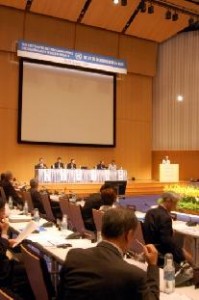Nuclear weapons can be eliminated: Report from Niigata, Part 2
Sep. 6, 2009
Balance between "three pillars" is crucial to NPT Review Conference
by Yumi Kanazaki, Staff Writer
On the second day of the United Nations Conference on Disarmament Issues held in the city of Niigata, Libran Cabactulan, the Philippines ambassador and president-elect of the 2010 Nuclear Nonproliferation Treaty (NPT) Review Conference, stated in a speech that the key to enhancing the NPT regime is the well-balanced advance of the three pillars of the NPT: disarmament, non-proliferation and the peaceful use of nuclear energy.
Behind the use of the word “balanced” is the discontent of NPT member countries that feel the regime is not fair.
The NPT defines five countries, including the United States and Russia, as nuclear weapon states and imposes upon these nations the obligation to pursue nuclear disarmament. The other member nations are only granted the right to the peaceful use of nuclear energy but must accept inspections by the International Atomic Energy Agency.
However, unsettling developments have occurred, one after another. North Korea has declared its withdrawal from the treaty and has conducted nuclear tests. Iran is pursuing uranium enrichment efforts. An emphasis on nuclear non-proliferation alone, though, could lead to paying little heed to the unsatisfactory efforts for disarmament on the part of the nuclear states while further limiting the right to the peaceful use of nuclear energy. Such a scenario would further aggravate the complaints of the non-nuclear states.
Striking a suitable balance between these three pillars is no easy task. Tetsuya Endo, former vice-chairman of the Atomic Energy Commission of Japan, pointed out at the Niigata conference that the expansion of the peaceful use of nuclear energy entails a risk of nuclear proliferation and that uranium enrichment for nuclear power plants and reprocessing spent nuclear fuel are closely associated with the development of nuclear weapons.
In addition, India, Pakistan and Israel have not joined the NPT. Khaled Abdel Rahman Shamaa, Deputy Assistant Minister of Foreign Affairs for Disarmament Affairs, Egypt, voiced his criticism of Israel’s de facto possession of nuclear weapons, saying, “Leaving the situation as it stands is tantamount to legalizing nuclear proliferation. All the countries should be treated equally in strengthening the nonproliferation regime.”
At the 1995 review conference, an indefinite extension to the NPT was decided and, to cope with the frustration of Arab nations, a resolution on the Middle East was adopted, which included encouraging the establishment of a regional zone that would be free of all weapons of mass destruction.
After 14 years, the international community has not been able to take effective steps to resolving Israel’s possession of nuclear arms. Mr. Shamaa asserted, “The real test of the 2010 NPT Review Conference will be whether an agreement can be reached for implementing what the resolution on the Middle East stipulates.”
(Originally published on September 4, 2009)
Related articles
Nuclear weapons can be eliminated: Report from Niigata, Part 1 (Sept. 4, 2009)
U.N. Conference on Disarmament Issues closes in Niigata, Japan (Aug. 31, 2009)
Prospects of NPT discussed on second day of U.N. Conference on Disarmament Issues (Aug. 28, 2009)








